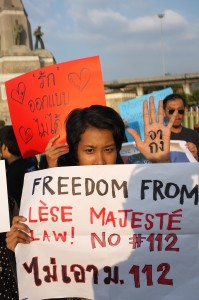Article 112 of Thailand’s criminal code is often described as the world’s harshest Lese Majeste (anti-royal insult) law. The controversial law is often invoked to censor web content and shut down websites. Aside from webmasters, even ordinary citizens have been jailed for allegedly sending mobile phone text messages that insult the royal family.
Scholars and activists have been demanding a reform of the law but the government has dismissed the petition. Thailand’s King is the most popular and well-loved public figure in the country. Politicians have argued that the law is necessary to promote national unity.
A contributor of Global Voices went to Bangkok and interviewed a former staff of the Committee to Investigate Lese Majeste Cases in the Royal Thai Police. The interviewee wishes to be anonymous for security concerns. Below is an excerpt of our conversation with the person:

A rare protest march over lese majeste law in Bangkok. Photo by Matthew Richards, copyright Demotix (12/10/2011)
When someone files a claim against another individual on a possible ground for violating Article 112 of the penal code at a police station, the claim will be examined by three divisions of the Royal Thai police. They can prosecute someone at this stage or submit the claims to the Central Investigation Bureau (CIB) in Bangkok, depending on the nature of the cases. Once the claims are submitted to the CIB, they are then passed on to the Committee for further investigation.
What is the role of each committee in handling Article 112 cases?
There are many different ways to violate Article 112. If it is a message on Facebook, the first sub-committee has the authority to block it or shut it down, for example. If the claim involves further investigation, then it gets passed on to the second sub-committee, which further assess whether the claim is valid. This applies to claims whose alleged perpetrators cannot be named.
In essence, the first two sub-committees determine whether claims do violate Article 112 or not. The second sub-committee, in particular, ensures there are legal grounds to prosecute the claims. Once that's determined, the third sub-committee, to which I belonged, investigate who the perpetrator is.
Below is a video interview of CJ Hinke, the head of Freedom Against Censorship Thailand. The video provides an overview of Thailand's “lèse majesté” law
Below is the continuation of our interview with a former investigator of Lese Majeste cases in Thailand. What is your opinion on the controversies generated by the application of the law?
Article 112 is a strange legislation. It is based on “emotions” and “norms” rather than the rule of law. The article applies to “Whoever defames, insults or threatens the King, Queen, the Heir-apparent or the Regent…,” and so forth. To determine whether someone “defames” the monarchy is an emotional rather than a logical process. As such, it is safer for the investigators to be on a safe side and find charges to be valid. No one wants to come across as being disloyal to the monarchy.
Do you think the law needs to be reformed?
We know that lese majeste is not doing any good to His Majesty but we are put in a very difficult position. As police, we feel society expects us to persecute those deemed a ‘threat to the nation’. There is too much emotion in society about the royal institution. If the Committee begins to relax its role, then other units both within and outside the police will scrutinize us. It's difficult to find an alternative to satisfy everyone. Hence, the status quo.
I do think that article 112 does need reform. But before we reform it we need to ask ourselves again for what or whom this article is meant? If the purpose of article 112 is national unity then I think the punishment is too harsh. Perhaps the problem is with the case processing…why is it a police's responsibility, for example? Could the Bureau of Royal Household take over? I don't think it is practical to do away with article 112 altogether. Too many people in society will oppose such move.
What should be reformed?
Indeed some people believe there is nothing wrong with the actual wording of article 112 per se, but the problem is its application. There is too much societal pressure to persecute violators so harsh that it becomes difficult to properly use the law. In truth I feel that since the law itself is flawed, enforcing it becomes inherently problematic.







9 comments
112 and the computer crimes laws are used to stop anyone anywhere in the world from analyising the Kings role in the modern history of Thailand. Therefore, Thailand cannot teach its children the correct history of the country. To move forward Thailand needs to scrap 112 and the computer crimes laws. There are already laws of slander and libel in force in the country to cover any actions that actually slander or libel the king, queen and heir apparent.
Reform will still stifle real debate with penalties of imprisonment.
SCRAP 112 and associated laws.